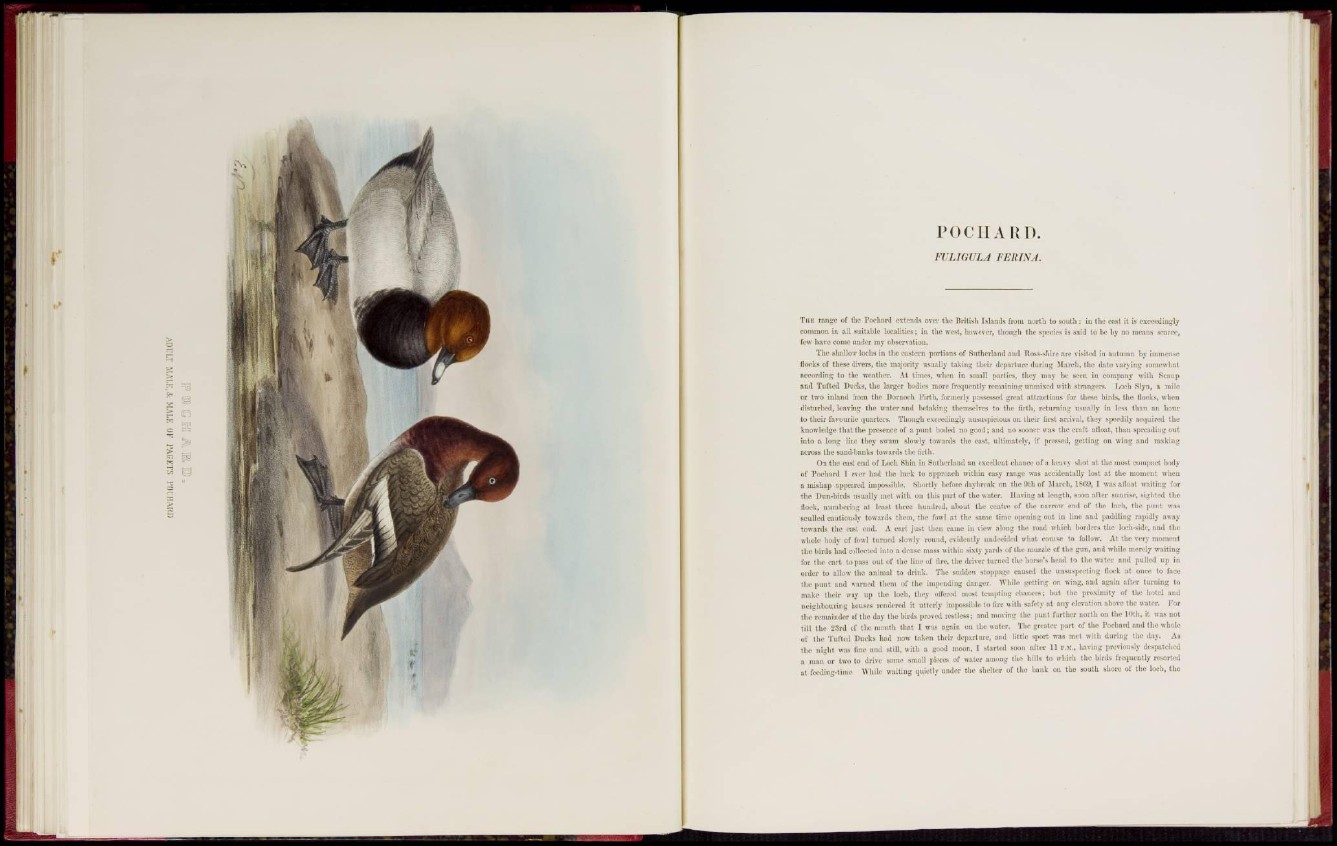
POCHAR D.
FULTGULA FERTNA.
THE range of the Pochard extendi over the British Islands from north to south: in the cast it is exceedingly
common in nil suitable localities; in the west, however, though the species is said to be by no menus scarce,
few have come under my observation.
The shallow lochs in the eastern portions of Sutherland and Ross-shire are visited in nuluinn by immense
flocks of these divers, the majority usually taking their •(•partem dill lag March,Ilio dale varying somewhat
according to the weather. At times, when in small pirlies, they may he seen in company with Scaup
and Tufled Ducks, the larger bodies more frequently remaining unmixed with strangers. Loch Slyn, a mile
or two inland from the Dornoch Firth, formerly possessed gnat attractions for these birds, the Hocks, a im
disturbed, leaving the water and betaking themselves to the firth, returning usually in less than an hour
to their favourite quarters. Though exceedingly unsuspicious on their firs! arrival, they speedily acquired the
knowledge that the presence of a punt boded no good ; and no sooner was the craft afloat, than spreading out
into a long line they swam slowly towards the cast, ultimately, if pressed, getting on wing and making
across the sand-banks towards the firth.
On the east end of Loeh Shin in Sutherland an excellent chance of a heavy shot at the most compact body
of Pochard I ever had the luck to approach within easy nage was accidentally lost at the moment when
a mishap appeared hnpo->ihle. Shortly- licfon- daybreak on the 9th of March, 1800, I was afloat wailing for
the Dun-birds usually met with on this part of the water. Having at length, soon after sunrise, sighted the
flock, numbering at least three hundred, about the centre of the narrow end of the loch, the punt was
sculled cautiously towards them, the fowl at the HUM time ojieningout in line and paddling rapidly away
towards the east end. A cart just then came in view along the road which borders the loch-side, and the
whole body of fowl turned slowly round, evidently undecided what course to follow, At the very moment
the birds had collected into a dense mass within sixty yards id'the muzzle of the gun, and while merely waiting
for the cart to pass out of the line of fire, the driver turned the horse's head lo the water and pulled up in
order to allow ihc animal to drink. The sudden stoppage caused the unsuspecting flock at once to face
the punt and warned Ihcm of the impending danger. While getting on wing, and again after turning to
make their way up the loeh, they ottered most tempting chances; but the proximily of the hotel and
iiciirhhouring houses rendrred it utlcrly impossible to fire with safety at any elevation above the water. For
the remainder of the day the birds proved restless; and moving the punt further north on the 10th, it was not
till the 23rd of the I ith that I was again on the water. The greater part of the Pochard and the whole
of the Tufted Ducks had now taken their departure, and little sport was met with during the day. As
the night was line and still, with a good moon, I started soon after 11 P.M., having previously DEAPATOBED
a man or two to drive BOUIC small pieces of water among the hills to which the birds frequently resorted
at feeding-time. While wailing quietly under the shelter of the hank on the south shoro of the loch, the